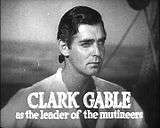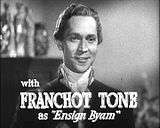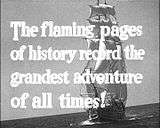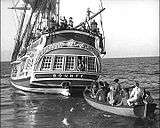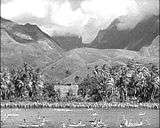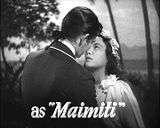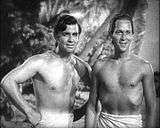Mutiny on the Bounty (1935 film)
| Mutiny on the Bounty | |
|---|---|
.jpg) Advertorial poster | |
| Directed by | Frank Lloyd |
| Produced by |
Frank Lloyd Irving Thalberg |
| Written by |
Talbot Jennings Jules Furthman Carey Wilson |
| Based on |
Mutiny on the Bounty (1932 novel) by Charles Nordhoff James Norman Hall |
| Starring |
Charles Laughton Clark Gable Franchot Tone Movita Mamo |
| Music by |
Score: Herbert Stothart Nat W. Finston Song: Walter Jurmann Bronisław Kaper |
| Cinematography | Arthur Edeson |
| Edited by | Margaret Booth |
| Distributed by | Metro-Goldwyn-Mayer |
Release dates |
|
Running time | 132 minutes |
| Country | United States |
| Language | English |
| Budget | $1,950,000[2] |
| Box office | $4,460,000[2][3] (rentals) |
Mutiny on the Bounty is an American 1935 drama starring Charles Laughton and Clark Gable, directed by Frank Lloyd based on the Charles Nordhoff and James Norman Hall novel Mutiny on the Bounty.
The film was one of the biggest hits of its time. Although its historical accuracy has been questioned (inevitably, as it is based on a novel), film critics consider this adaptation to be the best cinematic work inspired by the mutiny.
Plot
One night in Portsmouth, England in 1787, a press gang breaks into a local tavern and presses all of the men drinking there into naval service. One of the men inquires as to what ship they will sail on, and the press gang leader informs him that it is the HMS Bounty. Upon inquiring as to who the captain is, another of the men is told the captain is William Bligh (Charles Laughton), and attempts to escape, as Bligh is a brutal tyrant who routinely administers harsh punishment to officers and crew alike who lack discipline, cause any infraction on board the ship, or in any manner defy his authority. The Bounty leaves England several days later on a two-year voyage over the Pacific Ocean. Fletcher Christian (Clark Gable), the ship's lieutenant, is a formidable yet compassionate man who disapproves of Bligh's treatment of the crew. Roger Byam (Franchot Tone) is an idealistic midshipman who is divided between his loyalty to Bligh, owing to his family's naval tradition, and his friendship with Christian.
During the voyage, the enmity between Christian and Bligh grows after Christian openly challenges Bligh's unjust practices aboard the ship. When the ship arrives at the island of Tahiti, where the crew acquires breadfruit plants to take home, Bligh punishes Christian by refusing to let him leave the ship during their stay. Byam, meanwhile, sets up residency on the island, living with the island chief, Hitihiti (William Bambridge), and his daughter, Tehani (Movita Castaneda), and compiling an English dictionary of the Tahitian language. Hitihiti persuades Bligh to allow Christian a day pass on the island. Bligh agrees but quickly repeals the pass out of spite. Christian disregards the order and spends his one-day off the ship romancing a Tahitian girl, Maimiti (Mamo Clark). Christian promises her he will be back someday.
After leaving Tahiti the crew begins to talk of mutiny after Bligh's harsh discipline leads to the death of the ship's beloved surgeon, Mr. Bacchus (Dudley Digges), and Bligh cuts water rationing to the crew in favor of providing water for the breadfruit plants. Christian, although initially opposing the idea, decides he can no longer tolerate Bligh's brutality when he witnesses crew members shackled in iron chains, and he approves the mutiny. The crew raids the weapons cabinet and seizes the ship. Bligh and his loyalists are cast into a boat and set adrift at sea with a map and rations to ensure their survival. Due to Bligh's steady leadership, they are able to find their way back to land.
Meanwhile, Christian orders that Bounty return to Tahiti. Byam, who was in his cabin during the mutiny, disapproves of what Christian has done and decides the two can no longer be friends. Months later, Byam is married to Tehani and Christian has married Maimiti and has a child with her, while the rest of the crew are enjoying their freedom on the island. After a long estrangement, Byam and Christian reconcile their friendship. However, when the British ship HMS Pandora is spotted approaching, Byam and Christian decide they must part ways. Byam and several crew members remain on the island for the ship to take them back to England, while Christian leads the remaining crew, his wife and several Tahitian men and women back on board Bounty in search of a new island on which to seek refuge.
Byam boards the Pandora and, much to his surprise, discovers that Bligh is the captain. Bligh, who suspects that Byam was complicit in the mutiny, has him imprisoned for the remainder of the journey across the sea. Back in England Byam is court-martialed and found guilty of mutiny. Before the court condemns him, Byam speaks of Bligh's cruel, dehumanising conduct aboard Bounty. Due to the intervention of his friend Sir Joseph Banks (Henry Stephenson) and Lord Hood (David Torrence), Byam is pardoned by King George III and allowed to resume his naval career at sea.
Meanwhile, Christian has found Pitcairn, an uninhabited yet sustainable island that he believes will provide adequate refuge from the reach of the Royal Navy. After Bounty crashes on the rocks, Christian orders her to be burned.
Historical accuracy
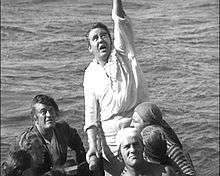
The movie contains several historical inaccuracies. Captain Bligh was never on board HMS Pandora, nor was he present at the trial of the mutineers who stayed on Tahiti. At the time he was halfway around the world on a second voyage for breadfruit plants. Fletcher Christian's father had died many years before Christian's travels on board Bounty, whereas the film shows the elder Christian at the trial. It should be noted, though, that the movie was always presented as an adaptation of the Nordhoff and Hall trilogy, which already differed from the actual story of the mutiny.
Bligh is depicted as a brutal, sadistic disciplinarian. Particular episodes include a keelhauling and flogging a dead man. Neither of these happened. Keelhauling was used rarely, if at all, and had been abandoned long before Bligh's time. Indeed, the meticulous record of Bounty's log reveals that the flogging rate was lower than the average for that time. Prior to the mutiny, Bounty had only two deaths—one seaman died of scurvy (not keelhauling), and the ship's surgeon died apparently of drink and indolence and not as a result of abuse by Bligh. Likewise, the film shows the mutineers taking over the ship only after killing several loyal crewmen, when in fact none died (although one crewman came very close to shooting Bligh until stopped by Christian). Lastly, Christian is shown being inspired to take over the ship after several crewmen have unjustly been put into irons by Bligh; this is fictional.
In the final scene of the film, Gable gives a rousing speech to his fellow mutineers, speaking of creating a perfect society of free men on Pitcairn, away from Bligh and the navy. The reality was very different as mutineers enslaved Tahitian men.
For historical accuracy, Clark Gable reluctantly had to shave off his famous moustache because the sailors in the Royal Navy in the 18th century had to be clean-shaven. Midshipman Roger Byam was based on a real person, Midshipman Peter Heywood, who is not listed in the novel or motion picture. Just as the fictional Byam is pardoned at the end of the film, the real-life Peter Heywood was pardoned for his part in the mutiny. MGM trailers in 1935 made an error calling Midshipman Byam an ensign.
Mutineer Thomas Ellison is depicted as being allowed to see his wife before his execution. There is no record to indicate that the real Ellison was married, and in any case a consolation visit of this type never would have been permitted in real life.
Cast
- Charles Laughton as Capt. Bligh
- Clark Gable as Fletcher Christian
- Franchot Tone as Byam
- Herbert Mundin as Smith
- Eddie Quillan as Ellison
- Dudley Digges as Bacchus
- Donald Crisp as Burkitt
- Henry Stephenson as Sir Joseph Banks
- Francis Lister as Capt. Nelson
- Spring Byington as Mrs. Byam
- Movita Castaneda as Tehani (as Movita)
- Mamo Clark as Maimiti (as Mamo)
- Byron Russell as Quintal
- David Torrence as Lord Hood
- Douglas Walton as Stewart
- Ian Wolfe as Maggs
- DeWitt Jennings as Fryer
- Ivan F. Simpson as Morgan (as Ivan Simpson)
- Vernon Downing as Hayward
- Bill Bambridge as Hitihiti (as William Bambridge)
- Marion Clayton as Mary Ellison (as Marion Clayton)
- Stanley Fields as Muspratt
- Wallis Clark as Morrison
- Crauford Kent as Lt. Edwards (as Craufurd Kent)
- Pat Flaherty as Churchill
- Alec Craig as McCoy
- Hal LeSueur as Millard
- Harry Allen as Wherryman (uncredited)
Production
Filming locations
- French Polynesia
- Metro-Goldwyn-Mayer Studios – 10202 W. Washington Blvd., Culver City, California, USA (studio)
- Monterey Bay, Monterey, California, USA
- Monterey Harbor, Monterey, California, USA
- Sailing Ship Restaurant, Pier 42, The Embarcadero, San Francisco, California, USA (ship "Ellen" as "The Bounty")
- San Miguel Island, California, USA
- Santa Barbara Channel, Channel Islands, California, USA
- Santa Catalina Island, Channel Islands, California, USA
- South Beach Harbor, South Beach, San Francisco, California, USA (ship "Ellen" as "The Bounty")
- South Pacific, Pacific Ocean
- Tahiti, French Polynesia
James Cagney (then on a hiatus from Warner Bros. during a contract dispute) and future stars David Niven and Dick Haymes were uncredited extras in the movie. Cagney is clearly visible toward the beginning of the film. He was sailing his boat near where the film was shooting near Catalina Island; director Frank Lloyd was an old friend of his, and Cagney asked him if he could play a small part in the film, saying, jokingly, "I need the money". Lloyd had Cagney dressed in a crewman's clothes and put him in the background of a few scenes.
Charles Laughton, who had a severe self-image complex concerning his weight and unattractive looks, suffered horribly in comparing himself to the handsome, masculine Clark Gable.[4] Laughton would constantly watch his own walk, gestures, and face, making sure not to let his complex be projected.[4]
Ship
A British merchant navy officer[5] recalled in his memoirs seeing the fore and aft-rigged schooner Commodore II being broken up in Cape Town in 1945, having suffered severe gale damage, and that this was the ship that had been re-rigged for the film.
Reception
Contemporary reviews were very positive. Andre Sennwald of The New York Times wrote, "Grim, brutal, sturdily romantic, made out of horror and desperate courage, it is as savagely exciting and rousingly dramatic a photoplay as has come out of Hollywood in recent years. The Nordhoff-Hall trilogy was, of course, born to be filmed, and Metro-Goldwyn-Mayer has given it the kind of production a great story deserves."[6] The Hollywood Reporter raved that it was "one of the greatest films of all time", with "the epic sweep of the sea itself."[7] Variety called it "Hollywood at its very best. The story certainly could not have been presented as powerfully through any other medium."[8] Film Daily wrote, "This is one of the most important productions since the inception of talking pictures. It is grim, gripping and pictorially perfect."[9] John Mosher of The New Yorker declared that the filmmakers had "done a good, solid, fine job" and wrote that Laughton's performance as Captain Bligh "may not be exactly the image of the original brute, but it's a Laughton masterpiece."[10] Mutiny on the Bounty topped the annual Film Daily poll of 523 critics as the best film of 1936 (it was released too late in the year to appear on the 1935 ballot).[11][12]
According to MGM records the film earned $2,250,000 in the US and Canada and $2,210,000 elsewhere resulting in a profit of $909,000.[2]
Awards and honors
Academy Awards
This film is, as of 2015, the last Best Picture winner to win in no other category (following The Broadway Melody and Grand Hotel). It is the only film to have three Best Actor nominations. As a result of this a supporting category was created for the Oscars.
| Award | Nominee | Result |
|---|---|---|
| Best Picture | Metro-Goldwyn-Mayer (Irving Thalberg and Albert Lewin producers) |
Won |
| Best Director | Frank Lloyd | John Ford – The Informer |
| Best Actor | Clark Gable | Victor McLaglen – The Informer |
| Charles Laughton | ||
| Franchot Tone | ||
| Best Writing, Screenplay | Jules Furthman, Talbot Jennings and Carey Wilson | Dudley Nichols – The Informer |
| Best Music, Scoring | Nat W. Finston and Herbert Stothart ("Love Song of Tahiti" written by Walter Jurmann, uncredited) |
Max Steiner – The Informer |
| Best Film Editing | Margaret Booth | Ralph Dawson – A Midsummer Night's Dream |
Other honors
American Film Institute recognition
- AFI's 100 Years... 100 Movies #86
- AFI's 100 Years... 100 Heroes and Villains:
- Captain Bligh, Villain #19
Gallery
Proposed sequels
In 1940 Frank Lloyd was reported as wanting to make a film about the life of Captain Bligh starring Spencer Tracy or Charles Laughton, at Universal. It was never made.[13]
In 1945 it was reported that MGM would make a sequel with Gable, Christian of the Bounty. It would be based on a novel by Charles Nordhoff about Christian's romantic adventures in England and South America following the colonization of Pitcairn Island and would be produced by Carey Wilson.[14] It was never made.
Other film versions
A 1962 three-hour-plus widescreen Technicolor remake, starring Marlon Brando as Fletcher Christian and Trevor Howard as Capt. Bligh, was a disaster both critically and financially at the time, but has come to be re-evaluated by some critics.
In 1984 Mel Gibson played Christian opposite Anthony Hopkins as Bligh in a film (based not upon the Nordhoff-Hall novels but on an historical work by Richard Hough) called The Bounty. This latest version, which gives a far more sympathetic view of Bligh, is considered to be the closest to historical events.
The 1935 version was itself not the first film account of the mutiny. In 1933 an Australian film entitled In the Wake of the Bounty, with the then-unknown Errol Flynn as Fletcher Christian, was released, but was not successful and received few bookings outside Australia. There was also an even earlier film, the 1916 Australian–New Zealand film, The Mutiny on the Bounty directed by Raymond Longford.
Parodies
- Friz Freleng's cartoon Mutiny on the Bunny casts Yosemite Sam (called Shanghai Sam) as a foul-tempered skipper who shanghais Bugs Bunny, only to see Bugs rebel. Also, in one scene in Freleng's earlier Buccaneer Bunny, Bugs dresses up as Capt. Bligh (including a visual and vocal impression of Charles Laughton) and barks out orders to Sam (called Seagoin' Sam).
- The 1967 Lost in Space episode "Mutiny in Space" features Ronald Long imitating Charles Laughton in the role of spaceship captain "Admiral Zahrk."
- Morecambe and Wise performed a sketch with Arthur Lowe (famous for playing Captain Mainwaring in Dad's Army) as Captain Bligh. At the end of the sketch it is announced Bligh has some loyal crewmen who turn out to be other stars of Dad's Army.
- "Holidays at Home", a 1978 episode of It Ain't Half Hot Mum, includes a dream sequence where the sitcom's cast enact scenes from the film.
- In The Simpsons episode "The Wettest Stories Ever Told" features the family telling stories set on ships. The second segment is a parody on Mutiny on the Bounty and casts Principal Skinner as Capt. Bligh, brutalizing the crew members (played by Bart, Milhouse, Martin, Nelson, Jimbo, Dolph and Kearney).
References
- ↑ Brown, Gene (1995). Movie Time: A Chronology of Hollywood and the Movie Industry from Its Beginnings to the Present. New York: Macmillan. p. 125. ISBN 0-02-860429-6. In New York, the film opened at the Capitol Theatre, the site of many prestigious MGM film premieres.
- 1 2 3 The Eddie Mannix Ledger, Los Angeles: Margaret Herrick Library, Center for Motion Picture Study.
- ↑ Mutiny on the Bounty, Overview. Movie Guy 24/7. Retrieved April 14, 2013
- 1 2 "Charles Laughton". Hollywood Greats. Series 2. Episode 5. August 31, 1978. 12-13 minutes in.
- ↑ Le Page, Peter "A working lifetime" (1991)
- ↑ Sennwald, Andre (November 9, 1935). "Movie Review – Mutiny on the Bounty". The New York Times. Retrieved July 23, 2015.
- ↑ "MGM 'Mutiny' A Smash". The Hollywood Reporter. October 28, 1935. p. 1.
- ↑ "Mutiny on the Bounty". Variety. New York. November 13, 1935. p. 16.
- ↑ "Reviews". Film Daily. New York. November 1, 1935. p. 7.
- ↑ Mosher, John (November 16, 1935). "The Current Cinema". The New Yorker. p. 99.
- ↑ ""Mutiny On The Bounty" Heads '36 "Ten Best"". Film Daily. New York. January 7, 1937. p. 1.
- ↑ ""Copperfield" Heads 1935 "Ten Best" List". Film Daily. New York. January 9, 1936. p. 6.
- ↑ "TWO STUDIOS PLAN A BOUNTY 'MUTINY': M-G-M and Paramount Race to Complete Productions of Films on Sea Adventure". New York Times. 2 Nov 1959. p. 39.
- ↑ "NEWS OF THE SCREEN: M-G-M to Make 'Christian of Bounty,' With Gable-- 'Southerner' Premiere Again Postponed Of Local Origin". New York Times. 14 Aug 1945. p. 17.
External links
| Wikiquote has quotations related to: Mutiny on the Bounty (1935 film) |
| Wikimedia Commons has media related to Mutiny on the Bounty (1935 film). |
- Mutiny on the Bounty (1935) at the Internet Movie Database
- Mutiny on the Bounty at the TCM Movie Database
- synopsis at AllMovie
- Mutiny on the Bounty at the American Film Institute Catalog
- Mutiny on the Bounty at Rotten Tomatoes
- Southseascinema.org
- Mutiny on the Bounty at Virtual History


